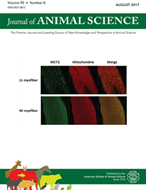-
Views
-
Cite
Cite
Terry D. Etherton, James P. Wiggins, Christina M. Evock, Chung S. Chung, John F. Rebhun, Paul E. Walton, Norman C. Steele, Stimulation of Pig Growth Performance by Porcine Growth Hormone: Determination of the Dose-Response Relationship, Journal of Animal Science, Volume 64, Issue 2, February 1987, Pages 433–443, https://doi.org/10.2527/jas1987.642433x
Close - Share Icon Share
Abstract
The present study was undertaken to determine the relationship between dose of porcine growth hormone (pGH) and growth performance of pigs. Porcine GH was administered daily for 35 d [buffer-injected control=(C); 10 µg/kg body weight (BW)=(L); 30 µg/kg BW=(M); 70 µg/kg BW=(H)] to barrows (initial wt=50 kg). Growth rate was significantly increased by pGH (14% for H dose vs C). Feed efficiency was increased in a dose-related manner (L=7%, M=10%, H=17%) by pGH. There was a concurrent change in carcass composition of pGH-treated pigs. The H dose of pGH decreased the percentage of carcass lipid by 25% (P<.05). Muscle mass was significantly increased in H vs C pigs (31 vs 26 kg). Serum insulin-like growth factor 1 (IGF-1) concentration increased in a manner that was linearly related to the pGH dose (r=.87). No antibodies to pGH were detected in any of the pigs. In summary, these results extend our earlier findings that pGH increases growth performance markedly. Based on the present findings it appears that the maximally effective dose of pGH is greater than 70 µg•kg BW−1•d−1 since several indices of the growth-promoting and metabolic effects of pGH (% carcass protein, % carcass lipid and feed efficiency) had not plateaued.





